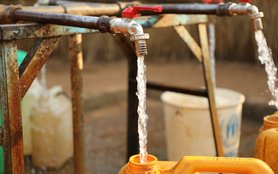Updated December 2019
Countries tip into famine and dangerous levels of hunger when people are unable to find, grow, or pay for food. Chronic poverty is part of the cause, coupled with weak governance and conflict—especially when the fighting displaces families, cutting them off from outside assistance, while destroying their markets and making it impossible for them to make a living or work their fields.
South Sudan is facing a catastrophic humanitarian crisis driven by seven years of conflict.
Humanitarian groups expect 7.5 million people will need humanitarian aid in 2020. One third of South Sudan's pre-war population has been displaced -- 1.5 million are in the country, but another 2.2 million have fled South Sudan for other countries in the region. Four and a half million people -- about 40 percent of the country -- are facing severe hunger
In a country that has already faced dire food security problems, devastating floods in October/November 2019 have affected 900,000 people, washed away crops before harvest, and killed livestock. This will make the 2020 dry season (a time when food normally become scarce) more difficult than ever.
Oxfam is distributing food to almost 270,000 people on a regular basis, and has been providing clean water and sanitation services to help prevent the spread of diseases—like cholera and diarrhea—which can lead to malnutrition and prove fatal. In Juba City, Oxfam has helped install a solar water treatment plant that supplies traders selling water to tens of thousands of people at a cheaper price than previously available. In three of the worst flood-affected areas, Oxfam is helping the communities with hygiene items and clean water as well as food.
Famine was declared in parts of South Sudan in February 2017. Since then, humanitarian aid has helped halt famine, but recent flooding and the threat of continued conflict increase the risk of famine in South Sudan.
Somalia
Drought spanning four consecutive rainy seasons in some parts of Somalia has 3.2 million people experiencing emergency or crisis levels of food insecurity, including 1.2 million malnourished children. In total, Oxfam estimates 5.4 million are in need of humanitarian assistance.
War, blockade, high food and fuel prices have pushed Yemen to the verge of famine. Relentless fighting is leaving people without clean water, food, hospitals, and schools.
Since April 2017, there have been more than 1,073,082 suspected cases of cholera, and more than 2,263 deaths from this preventable disease as a direct result of conflict. This is the largest and fastest-spreading cholera outbreak in recorded history.
There are already a shocking 20 million people—65 percent of the population—who don’t know where they’ll get their next meal, with 7.4 million in need of nutrition assistance. More than three million people have fled their homes, and 24 million people (79 percent of the population) are in need of humanitarian assistance.
Since July 2015, Oxfam has reached 1.5 million people in nine governorates of Yemen with water and sanitation services, cash assistance, and food vouchers.
In response to a cholera outbreak, Oxfam is delivering water, sanitation, and hygiene to help prevent the spread of the disease.
Oxfam estimates 10.8 million people in Ethiopia are affected by erratic or complete lack of rain since late 2015. We have reached more than 878,000 people with clean water and other services, and immunized one million animals. In the Somali region, Oxfam has responded to a serious outbreak of acute watery diarrhea disease with daily access to clean water for 864,776 people, and by teaching people how to prevent such dangerous maladies. We have distributed cash to more than 200,000 individuals across the Somali region.
Kenya
The government of Kenya is estimating the number of people who are severely food insecure will be 2 million in a worsening drought. In northern areas, where for years Oxfam has worked with communities to help build their resilience to dry spells, we are helping communities repair their wells to ensure families can survive this unusually severe emergency.
Oxfam has rehabilitated wells in Wajir and Turkana counties that are now providing clean water to more than 600,000 people. We will also provide families with items like jerry cans and buckets so they can store water safely, as well as chlorine to treat water and soap for good hygiene. Oxfam has also distributed cash to 36,000 people.
We urgently need your support to help save lives in these areas. Please donate now to help.







Spread the word
Help us build a global movement for change.